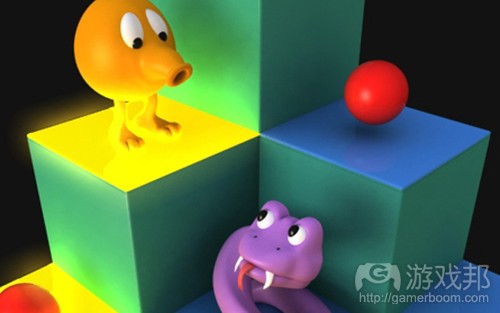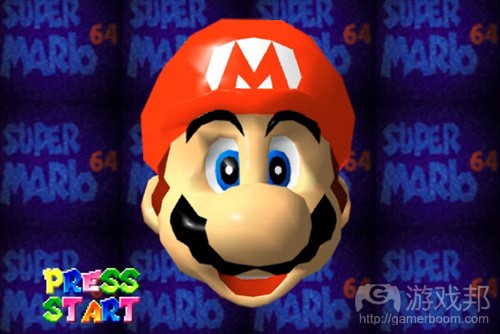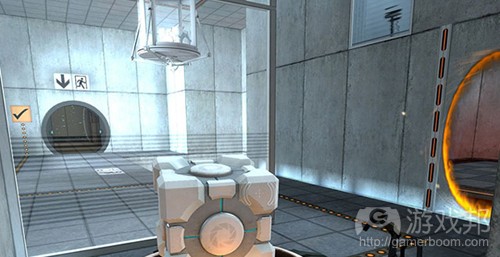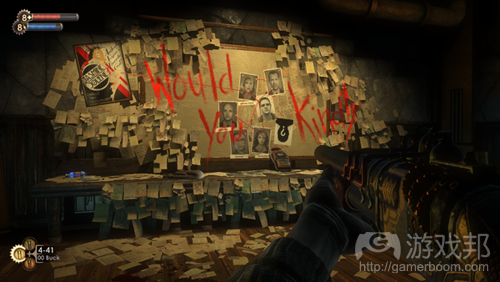列举电子游戏史上最经典的5句台词
作者:Rus McLaughlin
评论家们经常批评游戏糟糕的剧情和蹩脚的对白。但并不是像“Green elf…is about to die”和Jill sandwiches这么简单。有时候,我们要说“FINISH HIM!”才能表现我们的得意。这条出自《格斗之王》的命令,两个单词就完全改变了几乎所有格斗游戏的基调,将半友好的技竞变成残忍血腥的修罗场。这种情绪确实能引起玩家的共鸣。
当开发商真正开始考虑可以做什么游戏和可以做成什么样的游戏时,其结果都反映在对白上。所以我从5款游戏中摘录了5句话,这5句话不止影响了这些游戏的玩家,甚至是为整个行业指引了新方向。
“BEWARE…I LIVE!”
街机游戏通常不以创造情绪反应著称。但是出自Williams Electronics的太空射击游戏《Sinistar》却能与《Joust》、《Robotron: 2084》和《Defender》等经典游戏齐名。
你可以说《Sinistar》是早期的生存恐怖游戏,因为你花了全部的时间,绝望地准备与事实上不可停止的机器恶魔决斗,你无法射击也不能中止这个家伙。当它的工人飞船完成Sinistar的装配,它会发出立体声(这是最早使用立体声的游戏之一)让你知道它正在逼近;在你的小房间里,它隆隆咆哮声从两侧的耳麦里传来。然后Sinistar给了你一个最好的警告:“跑啊,胆小鬼!”你真的跑了,使出全力拉控制杆,保佑自己从小行星上采集的sinibomb可以至少让这只BOSS减速。
街机玩家在之后的16年里不曾体会到这种大汗淋漓的快感,直到《劲舞革命》诞生。
“@!#?@!”
回到1982年,游戏并没有给玩家太多可识别的角色。基本上,你玩的就是一个无脸的太空飞船或永远饥肠辘辘的小黄点。甚至《Donkey Kong》的马里奥除了让人对他的坚持不懈有印象以外,也没有其他可记忆的。但冒失的木偶仔Q*Bert却有性格——他是玩街机的孩子会为之动容的角色。当他的众多敌人之一最终猛撞上他的时候,Q*Bert很不高兴,后果很严重。他骂了一句好笑的脏话,从此让他的不满名扬世界。
音频工程师David Thiel最初打算让游戏说“你得了10000点积分”,但那时不管用;沮丧之中,他在声音编码中胡乱输了一串数字。可笑的是,这也成为Q*Bert的受挫的声音,同时它的实际拼写一度成为游戏的名称——在标题栏上出现了一些用“@!#?@!”搭成的小匣子。无论如何,它的情绪才是重点,因为Q*Bert的存在,我们终于有一个可以识别的游戏角色了。可能我们并没有为听到这种火星文一样的内容做好心理准备,但都知道他是到底想说什么,到底在想什么。
“It’s-a me, Mario!”
我们玩过了《大金刚》、《马里奥兄弟》、《超级马里奥兄弟1/2/3》和几款《超级马里奥大陆》以及《超级马里奥世界》。这款以勇敢的小水管工为主角的游戏是史上最卖作的游戏,拯救了整个美国的家庭游戏机产业,普及率几乎达到人手一部。
但《超级马里奥64》让我们第一次听到了他的声音。他的声音听起来很快乐很热情,正是我们想象中的样子。
配音演员Charles Martinet几乎错过了整个试镜,成为当天的最后一位。当任天堂告诉他要扮演一个来自Brooklyn的水管工向孩子们说关于这款电子游戏的事,Martinet忘记他应该发出粗犷声音,相反地,发出咿咿呀呀的尖锐的声音,就像在做披萨饼。他的磁带是唯一进入内政部的磁带。这个角色终于找到了对路的配音。
所以当我们塞进《马里奥64》的卡盘,马里奥就在标题页面上眨眼微笑着向我们问好,现在有了3D多边形技术,他的面孔渲染得更加精细饱满了。马里奥的声音完全体现了马里奥和他所代表的东西:乐趣。甚至在16年以后,马里奥跳在半空中,兴奋地举着拳头的形象可以代表当时的玩家和整个游戏,因为“Wah-HOO!”的声音无时不刻地伴随着它。
“This was a triumph. I’m making a note here: HUGE SUCCESS!”
在你将她炸成碎片后,一个非常特别的人出来庆祝了。
GLaDOS是《传送门》中精神错乱的AI叙述者,作为玩家的向导,她通过光圈科学的精神浓缩中心阻止、折磨和打击玩家,甚至当她将你投入火坑中,还向你许诺着蛋糕和幸福。但经过她的谎话连篇、致命陷阱和百般愚弄后,你终于实现报复了,你摧毁了GLaDOS,将她和设备一起抛弃在地下。
好了,完成“报复”了。随着鸣谢画面的出现,GLaDOS最后唱的歌“Still Alive”将你的胜利全部抹灭了,歌词中讲述她利用你遭受的苦难收集到了一些数据,以及你在外部世界的微弱生存机会。我们终于见识到她极其扭曲和阴险的世界观,但最击中要害的却是“Still Alive”这一句。我们说了那么多“打败”游戏的话,但GLaDOS却提醒我们,下一次我们打开《传送门》时,她仍然在那里,健康地、完整地等着我们。尝试一下摧毁最终BOSS后的得意感吧。
“Would you kindly…”
游戏不断地告诉我们要做什么。去拯救公主。走过那片地域。杀掉那个人。他们甚至发明了一类角色——向导,专门告诉我们接下来做什么。在一场毁灭性的后游戏启示中,《生化奇兵》充分诠释了“善变”的整个概念,让你再也不信任它了。
这个向导角色Atlas(犯罪头目Frank Fontaine的别名)不是在帮助你,而是用迷惑人心的命令指挥《生化奇兵》中的沉默主角Jack,这句命令就是“Would you kindly?”你甚至没有注意到Fontaine经常使用这种假友好的命令让你达成他的目的。你只是玩游戏,对吧?错了。游戏一直在玩你。在你遇上大恶人Andrew Ryan的紧张关头,游戏夺走了你的所有自由意志,Atlas还是用那句话让你无条件地顺从他,然后在你无力的手上宣告自己的死亡,最后说出了那句令人刻骨铭心的话:“人类有权选择,奴隶只能服从”。(本文为游戏邦/gamerboom.com编译,拒绝任何不保留版权的转载,如需转载请联系:游戏邦)
5 game-changing video game quotes
by Rus McLaughlin
Critics regularly and rightfully knock video games for their oft-silly plots and cheesy dialogue. A ton of bad translations from the original Japanese (“All your base are belong to us,” anyone?) floating around doesn’t exactly help, either.
But it’s not all “Green elf…is about to die!” and Jill sandwiches. Occasionally, we get a “FINISH HIM!” to kick us out of our complacency. That one command in Mortal Kombat completely changed the tenor of nearly every fighting game from semi-friendly competitions to brutal bloodsports in the space of two words. The sentiment struck a chord.
When developers really start thinking about what games can do and what they can be, it usually comes out in the dialogue. So here’s five more quotes that took five games, the people who played them, and even the entire industry into dramatic new directions.
“BEWARE…I LIVE!”
Arcade games generally aren’t known for creating an emotional reaction. But Sinistar, a 1982 space shooter from Williams Electronics — better known for classics like Joust, Robotron 2084, and Defender — did. It made you panic.
You could call Sinistar an early survival-horror game, because you spend the entire time desperately preparing to fight a virtually unstoppable techno-demon that you can’t out-shoot or out-run. When its worker drones finished assembling Sinistar, it let you know it was coming for you in stereo sound (one of the first games to record in stereo); in the sit-down cabinets, its booming roars blasted out of speakers on either side of your head. Then Sinistar gave you the best advice ever: “Run, coward!” And you did, jamming the joystick as far as it would go and praying what few sinibombs you’d mined out of the asteroids could at least slow it down.
Arcade-goers wouldn’t sweat so much for another 16 years…when Dance Dance Revolution arrived.
“@!#?@!”
Back in the mists of 1982, games didn’t give players a whole lot of characters to identify with. Mostly, you played as a faceless spaceship or a perpetually hungry yellow dot. Even Donkey Kong’s Mario didn’t have a whole lot going on other than a determined sense of perseverance. But cheeky, muppet-looking Q*Bert had a personality…one a kid in an arcade could sympathize with. When one of his many enemies finally smashed into him, Q*Bert didn’t like it. And he let his displeasure be known with a small torrent of amusingly censored profanity.
Audio engineer David Thiel originally tried to get the game to say “You have gotten 10,000 bonus points,” but when that didn’t work, he jammed a random bunch of numbers into the sound chip in frustration. Ironically, that became the sound of Q*Bert’s frustration as well, while its physical spelling served as the game’s name for a while — a few cabinets were built with “@!#?@!” on the title board. Anyway, it’s the sentiment that counts, and with Q*Bert, we could finally identify with a video game character. Maybe we didn’t hear those four-letter words as intended, but we all knew exactly what he meant…and how he felt.
“It’s-a me, Mario!”
We’d played Donkey Kong, Mario Bros., Super Mario Bros. 1, 2, and 3, several Super Mario Lands, and Super Mario World. That plucky little plumber had sold more games than anyone in history and saved the entire home console industry in the U.S. almost single-handedly. He didn’t have anything to prove to anyone.
But Super Mario 64 was the first time we heard his voice. And he sounded just as happy and enthusiastic as we’d always imagined.
Voice actor Charles Martinet almost missed the audition entirely, crashing the last one of the day. When the Nintendo rep told him to do a plumber from Brooklyn talking to children about video games, Martinet ignored his instincts to play it gruff and instead unleashed a babbling, high-pitched ramble about making a-pizza pie. His tape was the only one sent to the home office. The icon had found his voice.
So when we slapped the Mario 64 cartridge in and Mario announced himself on the title screen, followed by his winking, smiling face now fully rendered in polyagonal 3D, it completely solidified Mario and what he stood for: fun. Even 16 years later, the image of Mario jumping into the air, fist high in joyous celebration, could easily represent gamers and gaming in its entirety…due in no small part to the “Wah-HOO!” that automatically accompanies it.
“This was a triumph. I’m making a note here: HUGE SUCCESS!”
It takes a very special person to celebrate after you’ve blown her to smithereens.
GLaDOS, Portal’s deranged A.I. narrator, serves as your guide, foil, tormentor, and deadly nemesis through Aperture Science’s brain-bending Enrichment Center, promising cake and happiness even as she lowers you into a fire. But after her constant lies, deadly traps, and a heaping helping of schoolyard-quality derision, you get your revenge by destroying GLaDOS and escaping her underground facility.
Well, except for the “revenge” part. As the credits roll, GLaDOS snatches your defeat from the jaws of victory with “Still Alive,” a pleasantly chipper song about all the wonderful data she’s collected via your suffering and your slim chances for survival in the (quite possibly devastated) outside world. Her wonderfully warped and generally sinister world-view is its own reward, but “Still Alive” hits deeper. We talk a lot about “beating” a game, but GLaDOS reminds us that the next time we fire Portal up, she’ll be there…healthy, whole, and waiting for us. Try feeling smug about destroying an end-boss after that.
“Would you kindly…”
Games constantly tell us what to do. Go save the princess. Walk through that door. Kill that person real good. They even invented a genre of character — the guide — specifically to inform us how to progress. And in one devastating late-game revelation, BioShock took that entire concept meta and made you distrust it forever.
Instead of helping, guide character Atlas (good-guy alias of crime boss Frank Fontaine) manipulates Jack, BioShock’s silent protagonist, with the post-hypnotic command phrase “Would you kindly?” You don’t even notice how often Fontaine uses that faux-friendly order to make you do what he wants. You’re just playing the game, right? Wrong. The game’s been playing you all along. BioShock finally throws your complete lack of free will back in your face during the showdown with big bad Andrew Ryan, where he would-you-kindlys you into complete submission, then orders his own death at your powerless hands with a final, haunting rebuke: “A man chooses…a slave obeys.”(source:venturebeat)
下一篇:关于设计自身游戏作品的5点建议












































 闽公网安备35020302001549号
闽公网安备35020302001549号